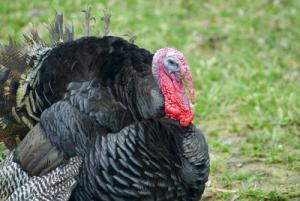 One of Nassim Nicholas Taleb’s earliest points in The Black Swan regarding the difficulties of prediction resides with the Thanksgiving turkey. Though Taleb is specifically addressing the inadequacy of using the present and even the past to predict the future, his discourse stimulated lots of branching thoughts for me that had little to do with his original point…
One of Nassim Nicholas Taleb’s earliest points in The Black Swan regarding the difficulties of prediction resides with the Thanksgiving turkey. Though Taleb is specifically addressing the inadequacy of using the present and even the past to predict the future, his discourse stimulated lots of branching thoughts for me that had little to do with his original point…
First though, Taleb’s point: For the first 1000 days of a hypothetical Thanksgiving turkey’s life, he is protected, cared for, fed, and treated kindly. Looking at days 1 – 1000 of his life, neither the turkey nor an uninformed observer would have reason to think his life would not continue as it has. But then on day one thousand and one (which this year would be November 26) something utterly unexpected and disastrous befalls the turkey. He experiences a very negative Black Swan event.
Thus Taleb illustrates the fallacy of relying on past observed data to make accurate future predictions, a practice that people seem to do all the time, particularly, says he, in economics, where they add insult to injury by making their faulty predictions with great authority and conviction. Just one among many flaws of the cosmic or worldly what of thinking, and a valid point… but not where the turkey illustration led me.
Let’s go back to the farmer who, of course, knows what he has planned. It’s the turkey who’s out of the loop. The comparison of the turkey’s relationship with the farmer and ours with God is unavoidable. You might argue that God would never do such a nasty thing as the farmer did to the turkey — raising us up and caring for us just to eat us! Well, of course He’s not going to eat us, but there are similarities nevertheless.
The farmer has plans and purposes that go far beyond the turkey’s simple life and understanding. He is raising the turkey to feed his family, to provide for their sustenance, nourishment, pleasure and blessing. The Thanksgiving turkey has become an icon of God’s blessing Americans in the warmth and closeness of family, and in celebration of the struggles, faith, needs and provisions for the people that began this great nation. And the freedom we still enjoy.
The turkey has to die, has to be consumed for the farmer’s (father’s?) purpose to be fulfulled. So it is with our Lord, the Father’s beloved Son, and so it will be for us as believers, followers who walk after the pattern established by the Son. There must be death for life to follow.
He who seeks to save his life will lose it; the one who loses his life will find it.
The farmer allows the turkey to continue in ignorance of his plans, first because the bird would be unable to understand his attempts to communicate them (even if the farmer came into the pen everyday and chased the turkey around with an axe, he’d only scare the creature not convey any sense of purpose), and second, even if he could, such plans would only frighten and distress the creature, producing a skinny bird and an unsatisfactory Thanksgiving meal.
Most of God’s people are in an uncannily parallel situation to the turkey. If they knew all the trials that were going to come their way, they would only live in fear and distress and probably go insane from the pressure, not fulfilling His plan at all. Therefore, most are left in the pen, relying on the notion that since yesterday passed without disaster, tomorrow will as well.
But it is not God’s desire for us to be out of the loop like a Thanksgiving turkey, pecking and scratching and gobbling about our pens in ignorance until the big Black Swan blindsides us. No, He may not want us to know specifically what’s ahead, but His word undeniably warns us there will be suffering, undeserved and deserved, in our futures . “Momentary light affliction is part of His plan for us. And if we learn His Word, make it part of our thinking, it will enable us to handle whatever suffering we have to face. The Black Swan event may be surprising, but not unexpected, and it will be something through which we can be assured we will see God’s hand and wisdom and grace.
His thoughts are not our thoughts; His ways are not our ways. We can’t know them apart from knowing His word, and I don’t mean a casual superficial knowledge, I mean really knowing it, digging deep, learning constantly from a prepared pastor. Such knowledge produces the capacity to receive greater knowledge, deeper knowledge, until we reach a point where it’s impossible for us to perceive the Black Swan’s that God places in our lives (has placed in eternity past, actually) as anything but positive and right.
Turkey image by freeimageslive.co.uk – valuestockphoto

